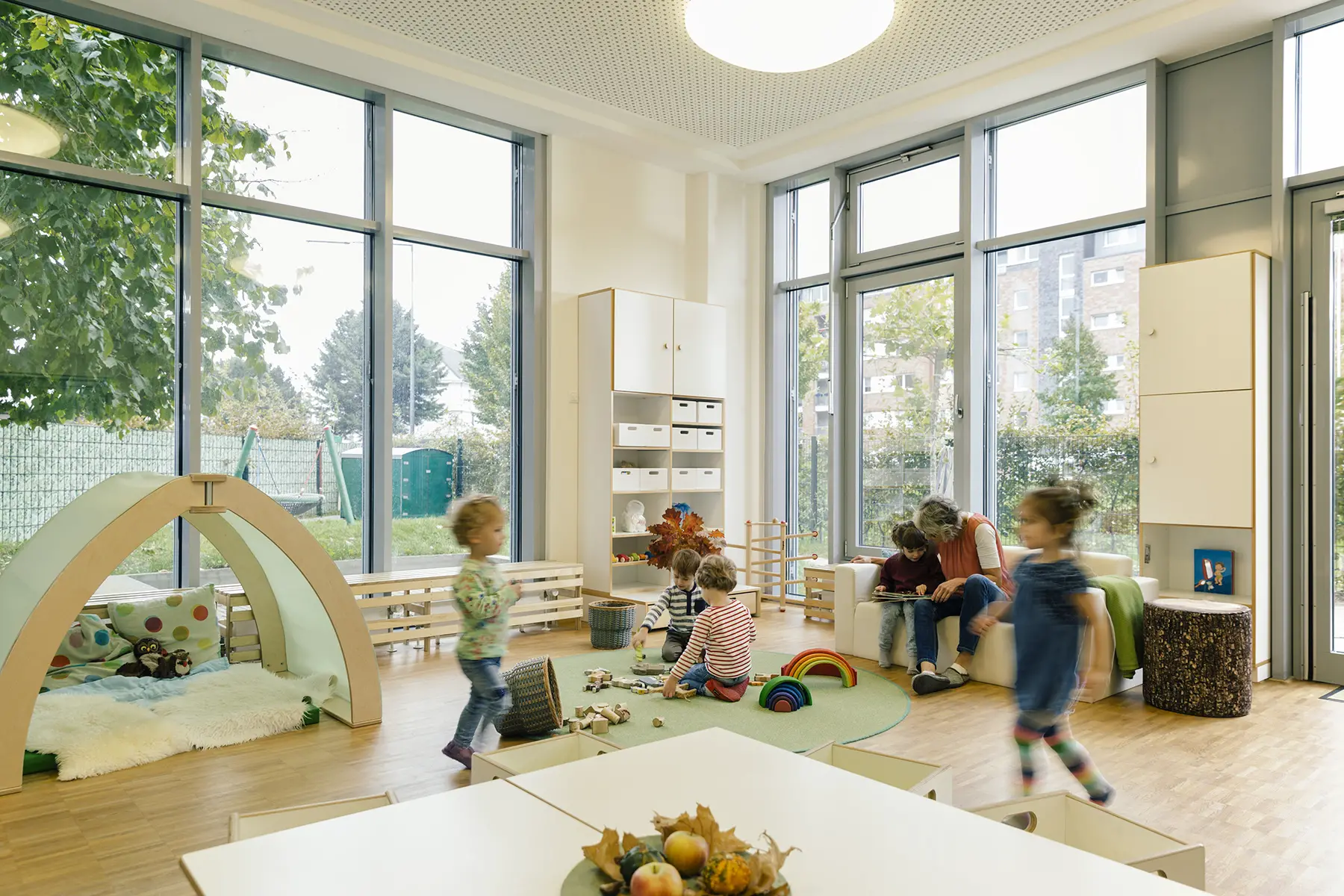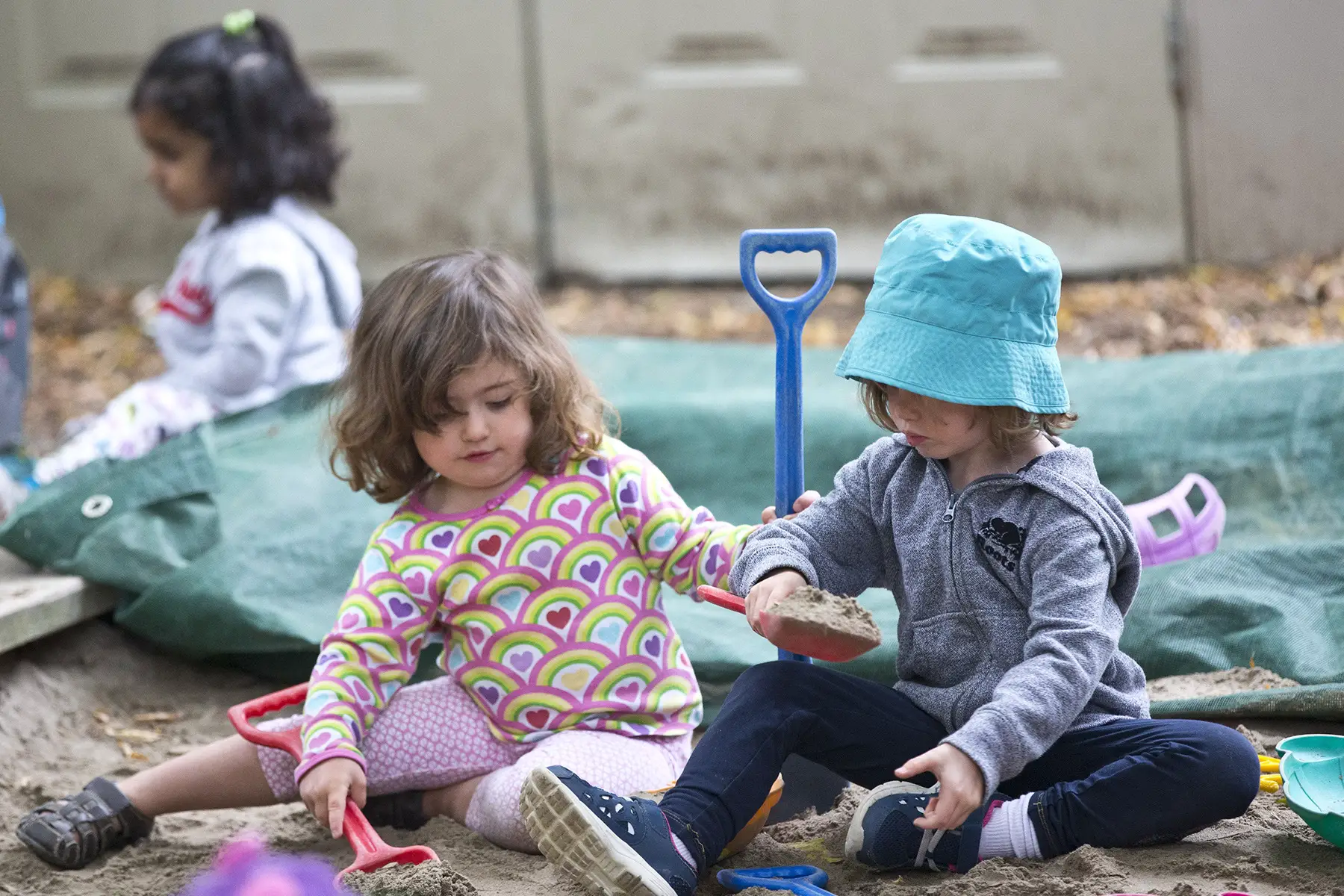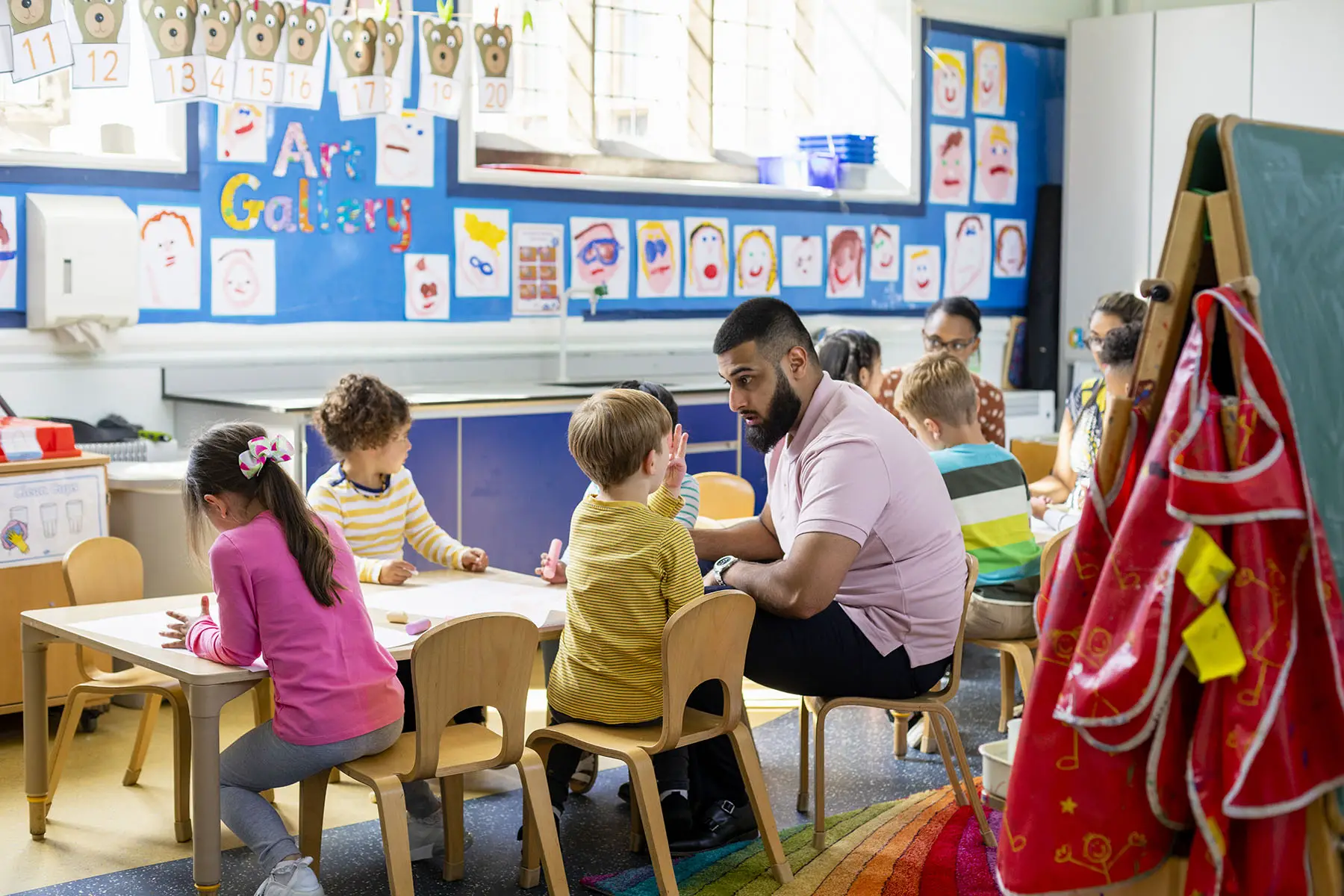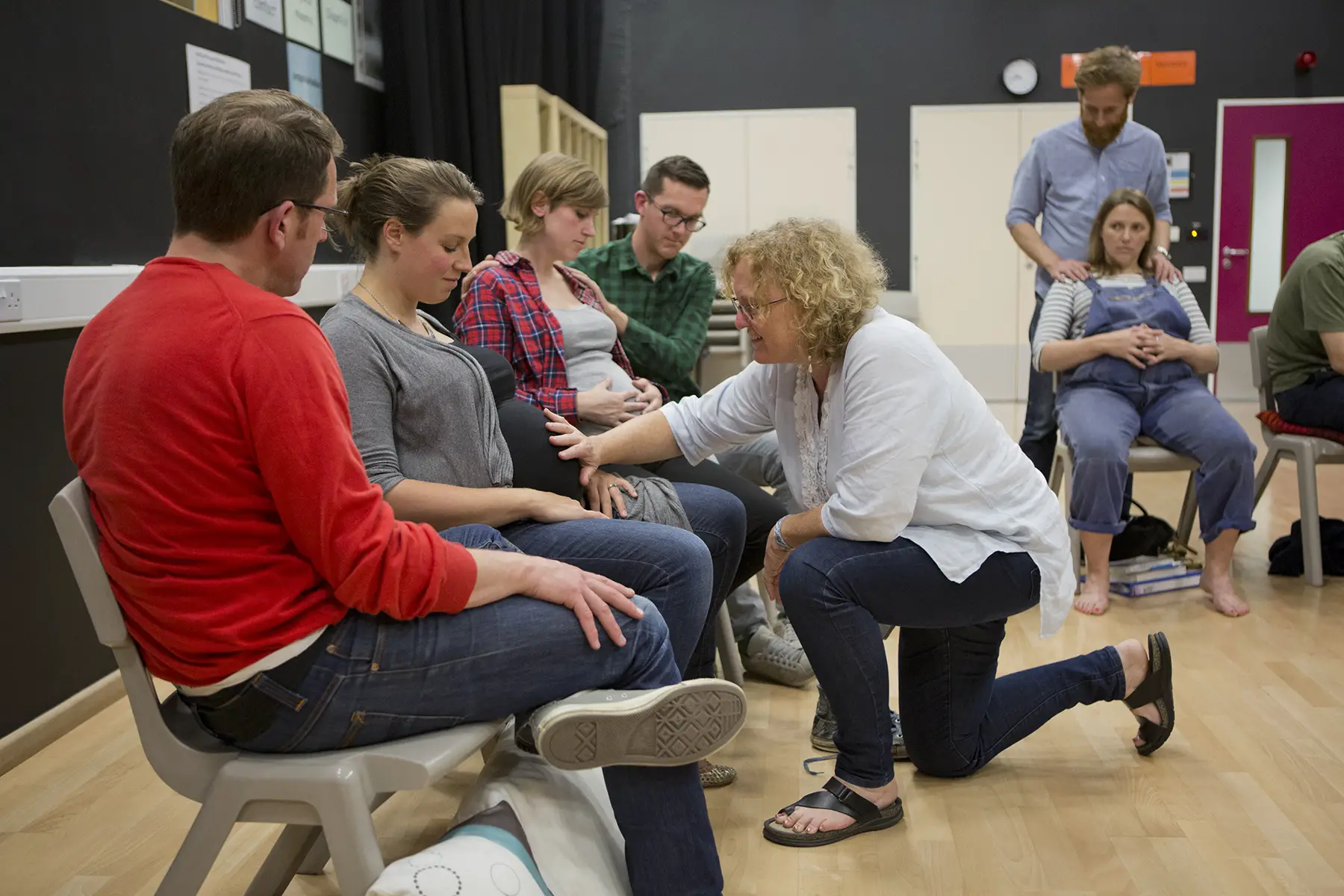If you’re moving to the UK with young kids, one of the first things you’ll want to do is figure out the education system or learn about the available childcare options. You can find various forms of daycare, such as nurseries and preschools in the UK; however, places are often limited, and you’ll need to pay fees.
In this article, you will find all the necessary information looking at the following topics:
- Childcare in the UK
- Types of daycare and preschool in the UK
- Day nurseries in the UK
- Preschools in the UK
- Sure Start Children’s Centres in the UK
- Crèches and playgroups in the UK
- International daycare and preschools in the UK
- Nurseries for children with Special Educational Needs (SEN) in the UK
- Other childcare options in the UK
- Transition from daycare and preschool to the big school in the UK
- General tips for daycare and preschool in the UK
- Useful resources
Childcare in the UK
Childcare is available in the UK from the child’s birth. Generally, private businesses run nurseries, with some public and voluntary service provisions. Although most daycare services charge fees, all UK residents can get state subsidies to cover a percentage of childcare costs. Notwithstanding, many parents still find childcare unaffordable.

Daycare such as preschool and nurseries are available for all children in the UK until they start primary school when they turn five. However, although schooling is compulsory from the age of five, sending your child to daycare is not compulsory. Still, most households choose to enroll young children in daycare if they don’t have alternatives, such as family members who can look after their children while at work.
Although the UK offers extensive options, with 72,044 providers in England (2020) alone, government spending on childcare (0.6% of GDP) is lower than the Organisation for Economic Co-operation and Development (OECD) average of 0.8%.
Types of daycare and preschool in the UK
Daycare in the UK includes the following types:
- Day nurseries
- Preschools and nursery schools
- Sure Start Children’s Centers
- Playgroups and crèches
Which type you use will depend on factors such as availability and your preferences. Many UK parents use a mixture of different types.
Day nurseries in the UK
What is a day nursery?
Day nurseries, which differ slightly from preschools in the UK, provide childcare for children up to five. However, the exact admissions criteria vary from nursery to nursery. For example, some nurseries don’t take babies, while others may accept children aged up to four. Most day nurseries are run as private businesses, but some are run by local authorities, non-profit groups, or schools. Some workplaces also provide nursery facilities, although this is not common.
Nurseries have to be registered and regulated in the UK. This needs to be with Ofsted in England, the Care Inspectorate in Scotland, the Care Inspectorate (CIW) in Wales, and the Health and Social Care Trust in Northern Ireland.
Trained nursery staff combine play and developmental learning in sessions, based on a curriculum that differs slightly across the UK:
- English nurseries – Early Years Foundation Stage (EYFS) curriculum
- Welsh nurseries – Foundation Phase curriculum
- Scottish nurseries – Early Years Framework (EYF)
- Northern Irish nurseries – Curricular Guidance for Pre-school Education
What do children do at day nursery?
Day nurseries are typically open Monday to Friday from as early as 07:00 till no later than 18:00. Most nurseries close during Christmas and Easter and bank holidays. Some also take a break during the summer holiday period.

The typical nursery day will be a mixture of play, learning, mealtime, and resting. Most nurseries provide meals and snacks included in the overall costs. Babies and younger toddlers will usually have a nap time around midday. Activities can include:
- Arts and crafts
- Storytelling
- Listening and dancing to music
- Playing with toys
- Sensory play involving elements such as water or sand
- Outdoor play sessions
- Basic number and language learning
Staff to child ratios are in place to ensure that children are properly supervised and get adequate attention. This varies according to children’s ages and staff experience but usually starts with one educator per three children under two. In most nurseries, children have an assigned key worker who monitors their individual progress in areas such as speech and language development.
The size of nurseries in the UK varies from small outlets with 15 to 20 children to larger establishments of 200 or more children. Many nurseries, especially bigger ones, split children into groups by age.
Finding and choosing a day nursery
It’s advisable to start looking for a suitable day nursery as early as possible, as places can be limited. Many nurseries restrict places to families within a catchment area, especially if they receive local authority funding. When doing your research, check local feedback and online reviews. It’s a good idea to arrange a visit to inspect the facilities and meet staff before making any decisions. Day nurseries, like preschools, all have Ofsted inspection reports, which parents can access.
You can search for registered nurseries via:
- Government websites – England and Wales, Scotland, and Northern Ireland
- Municipalities – your local council
- Online directories – childcare.co.uk
- Coram Family and Childcare – Childcare Finder
How to enroll in a day nursery
All nurseries have their own enrollment and registration process. You can usually find details of this on the nursery website. As places fill up quickly, applying as early as possible is advisable. This can sometimes be nine months to a year before the start date. Many nurseries also have yearly deadlines for applications. For example, if nursery starts in September, you may have to apply by the end of February that year.

The process typically involves completing an application form, which you can download from their website. You may need to provide details, such as your address, valid ID, child’s date of birth, and information on income if you are responsible for paying fees.
You may be invited for a short interview or introductory session if a nursery grants your child a place. Once you accept an offer, you’ll need to set up fee payments. This may be monthly or quarterly, depending on the nursery. If the nursery turns your application down, they will send you a list of alternatives or place you on their waiting list.
Many nurseries run their first week or two as introductory sessions where parents can attend to help their children settle in and become familiar with the environment. It also gives parents insight into their little one’s care.
Costs of a day nursery
According to the Childcare Survey (2021), the average cost for a child under two in the UK is:
- £137.69 per week for part-time care (25 hours a week)
- £263.81 per week for full-time care (50 hours a week)
Costs vary considerably across areas, with childcare in London and southeast England being the most expensive.
There are discounts available to help offset costs. These include:
- Free childcare – for two-year-olds if you receive certain state benefits
- 15 hours per week of free childcare – (minimum) for three to four-year-olds, rising to 30 hours per week for working families
- Tax-Free Childcare (TFC) – covering up to 20% of costs for a maximum of £2,000 per child/year if you earn at least the National Minimum Wage or Living Wage per 16 hours/week.
- Universal Credit – if you have a low income, you can claim back up to 85% of childcare costs
These discount schemes are only applicable to England. Scotland, Wales, and Northern Ireland oversee different funds.
Preschools in the UK
What is a preschool?
Preschools in the UK are similar to day nurseries, with a few key differences, such as:
- Preschools only take children from ages 2 to 3, whereas nurseries usually take younger children too
- Although both follow the same early years’ curriculum, learning is slightly more structured in preschools and will usually involve at least one qualified teacher
- Preschools are often based within a school setting, such as a primary school, although the running of the facility is contracted out to a private, public, or voluntary provider

You can choose to keep your child in a day nursery or transfer them to a preschool. The advantage of a preschool is that it is more akin to primary school, so many consider it to prepare toddlers better for the UK education system. However, parents may prefer to keep their children in a day nursery if they are well settled and happy.
Preschools and nursery schools must register with the same regulatory bodies as day nurseries.
What do children do at preschool?
Preschools in the UK are usually open from Mondays to Fridays, 08:00 to 17:00. They close during the school holidays. A typical preschool day involves a similar mix of play and developmental learning that you find at nurseries. However, there is more emphasis on the academic aspects. Children will spend more time on reading, basic maths, communication activities, and building cognitive skills. Sessions tend to be more structured, starting and finishing at set times, whereas there is more open play at day nurseries.
However, there is still plenty of play, such as arts and crafts or music sessions where children can learn basic musical instruments. There is also a strong emphasis on social and emotional development.
Finding and choosing a preschool
You can find a preschool or nursery school in the UK using the same tools as you would looking for a day nursery. These include:
- Government websites – England and Wales, Scotland, and Northern Ireland
- Municipalities – your local council
- Online directories – childcare.co.uk
- Coram Family and Childcare – Childcare Finder
Like day nurseries, you’ll need to begin your search early (maybe a year or more before the start date), check reviews, and arrange a visit to the site. You can also check official assessments, such as Ofsted reports, to review their quality of care.
As preschools are often linked with state facilities like primary schools, it is more likely that they will only take children from the local catchment area. However, this varies across areas and types of facilities.
How to enroll in preschool
Enrollment procedures for preschool are similar to day nurseries. You will have to enroll several months in advance, normally at least six months before the start of the school year (e.g., the last day of February). Typically, you can complete an online application form on the provider’s website.
You’ll need to provide personal details for both the child and parents. This may involve making copies of official documents, such as passports and birth certificates.
You should receive an early answer, giving you enough time to make alternative arrangements. It is common in the UK for parents to apply to several preschools and nursery schools in their area to ensure their child find a placement.
Costs of preschool
All parents in the UK can access a minimum number of funded childcare hours per week per child. In England, this amounts to 15 hours a week for a toddler aged three to four, increasing to 30 hours per week for working families. There are different systems in Scotland, Wales, and Northern Ireland.
According to the Childcare Survey (2021), the average costs for nursery and preschool in the UK, for children aged three to four, calculated with the free hours’ entitlement are:
- £101.58 (England), £145.70 (Scotland), and £89.12 (Wales) per week/full-time (50 hours) placements
- £52.44 (England) and £41.78 (Scotland) per week/part-time (25 hours) placements. Costs vary in Wales.
In addition to the free hours, parents in the UK may also be eligible for Tax-Free Childcare (TFC) and Universal Credit. You can check what help you can get, along with childcare costs, on the UK government website. You can also calculate your tax credits entitlement.
Sure Start Children’s Centres in the UK
What are Sure Start Centres?
The Sure Start program began in the late 1990s as a government scheme to ensure that children across the UK had equal access to early learning and childcare. The UK set up Sure Start Children’s Centers that provided a wide range of services relating to childcare, children’s healthcare, education, and parenting programs.

Many centers have closed since around 2010. Those remaining provide drop-in services, advice, and support for children and parents. However, you can still find some that operate as nurseries or contain daycare facilities for families with children under five.
What do children do at Sure Start Centres?
Although some centers contain nursery and crèche provisions, many provide a timetable of activities for both children and parents. These include:
- Play sessions for children
- Healthy eating for children and parents
- Parenting classes
- Antenatal services
- Family support
- Benefits advice
- Help with finding nursery and daycare provision
- Child development, for example, around speech and language
- Breastfeeding support
- Holiday activities for children
Opening hours vary but are usually between 08:00 and 18:00, and many centers stay open during school holidays.
Finding and choosing a Sure Start Center
You can find your local Sure Start Centre across the four nations via these portals:
How to enroll your child at a Sure Start Centre?
Most activities are individual sessions that run as classes or drop-in services. You generally don’t need to enroll in advance to access services, although you may need to sign up for individual activities or give your details if you show up for drop-in support.
These centers are often linked to local authorities, so you may need to be within a particular area or neighborhood to access their services.
Sure Start Centre costs in the UK
Activities and services are often financed through public funding or other grants, meaning they are free. Some may stipulate a nominal fee, for example, £2 to £3 per session, to cover costs.
If a Sure Start Centre provides full-time daycare, you will usually have to pay fees similar to other day nurseries.
Crèches and playgroups in the UK
Playgroups are less formal and run occasional sessions for children of different preschool ages. Provision varies across areas, but the organizers often run these in communities, children’s centers, or religious buildings. They will typically run for two to four hours. Some may operate as drop-in sessions where parents can stay, engage in the play, and meet other parents if they wish.

Private playgroups usually charge a fee per session, typically between £5 and £20. In many areas, you can also find free sessions run by volunteers.
Crèches provide time-limited daycare on certain premises, for example, leisure centers or workplaces. They allow parents to leave their children with qualified crèche workers while using facilities or services within the building, for example, gym sessions. In some areas, you can find independent crèches where you can leave children for a set period, usually up to two hours, allowing you time to run errands or do other things. Most crèches charge by the hour, usually around £5 to £10 per hour.
You can search the childcare digital portal to find playgroups and crèches. Also, check your local council website or the Coram Childcare Finder tool.
International daycare and preschools in the UK
Some international schools in the UK also provide preschool nurseries for children who secured a place at that specific primary school. Fees can be expensive, so you’ll usually pay more than for day nurseries or state preschools. However, the quality of childcare is high. You can also use your free weekly childcare hours for children aged three to four if you are a UK citizen, permanent resident, or have a visa that permits access to public funds.
The typical day at an international nursery or preschool is similar to state preschools in the UK. For instance, they also include a combination of play activities and learning development. However, the main difference is that these establishments don’t need to follow the national curriculum. Instead, they will typically follow their home country’s early years syllabus. The Independent Schools Inspectorate (ISI) regulates international schools instead of Ofsted or other regulators.
Examples of international schools that provide nurseries or preschools include:
- ACS Cobham
- Deutsche Schule London
- Lycée Français Charles de Gaulle
- TASIS American School in London (doesn’t provide specific nursery care but accepts children from the age of three)
Advantages and disadvantages of international daycare and preschool
Although international daycare is often more costly, its advantages include:
- Good standard of childcare, including high-quality facilities and access to a wide range of play activities and experiences
- Exposure to a multicultural environment and bilingual or trilingual learning
However, one key disadvantage is that children may integrate less into the local culture and language.
Nurseries for children with Special Educational Needs (SEN) in the UK
All nurseries in the UK must cater to and support children with special educational needs (SEN). They are also required to have a Special Educational Needs Coordinator (SENCO) in all countries apart from Scotland. The SENCO ensures that suitable facilities and activities are available for children with physical disabilities or learning difficulties.

You can also find nurseries catering exclusively to children with SEN in the UK. These may be part of a specialized school or run by organizations such as the I Can communication charity.
Families are entitled to free education and childcare for two-year-olds and up to 30 hours of free childcare for three to four-year-olds.
You can find out what SEN services are available in your area through your local council.
Other childcare options in the UK
There are a few other daycare options that you can investigate as an alternative to sending your child to nurseries or playgroups. These include:
- Childminders – self-employed regulated professionals who look after children in their own homes
- Nannies – provide childcare in the family home, sometimes living with the family
- Au Pairs – live-in carers, typically young international students, who can provide up to 30 hours per week of home support
Transition from daycare and preschool to the big school in the UK
Although daycare and preschool in the UK are not compulsory, it helps to prepare children for primary school. All children in the UK start school the year (September to August) of their fifth birthday. Preschool activities help with the transition to primary school in the following ways:
- Preparing them academically through curriculum-based teaching designed for the early years
- Developing children’s social and communication skills
- Familiarizing children with boundaries, rules, and structure
Another benefit of nurseries and preschools is that they usually help families enroll their children into suitable primary schools. Indeed, many preschools have links with particular primary schools and may even be based on the school site. The offer of a preschool placement will usually guarantee your child a place in the corresponding primary school.
General tips for daycare and preschool in the UK
- Involve your child when shopping for bags, drink bottles, or other items for daycare to create excitement
- Label your child’s possessions and clothing
- Meet your child’s keyworker before the start date
- Request a meet and greet to explore the facilities and meet the staff with your child before they start
- Choose a favorite toy/book/blanket that will accompany your child
- Settle your child in gradually (many daycares will suggest a phased introduction)
- Find out how you can become more involved through social media, parental groups, and communication systems
- Introduce a morning routine, (i.e., getting ready for nursery/preschool), before the start date, to ease them into it
Useful resources
- GOV.UK – a UK government website that provides information about childcare in the country
- mygov.scot – provides childcare information for Scotland
- gov.wales – provides childcare information for Wales
- NI Direct – offers information about childcare in Northern Ireland
- childcare.co.uk – provides information on childcare and how to find services
- Coram Family and Childcare – a childcare resource for families in the UK







